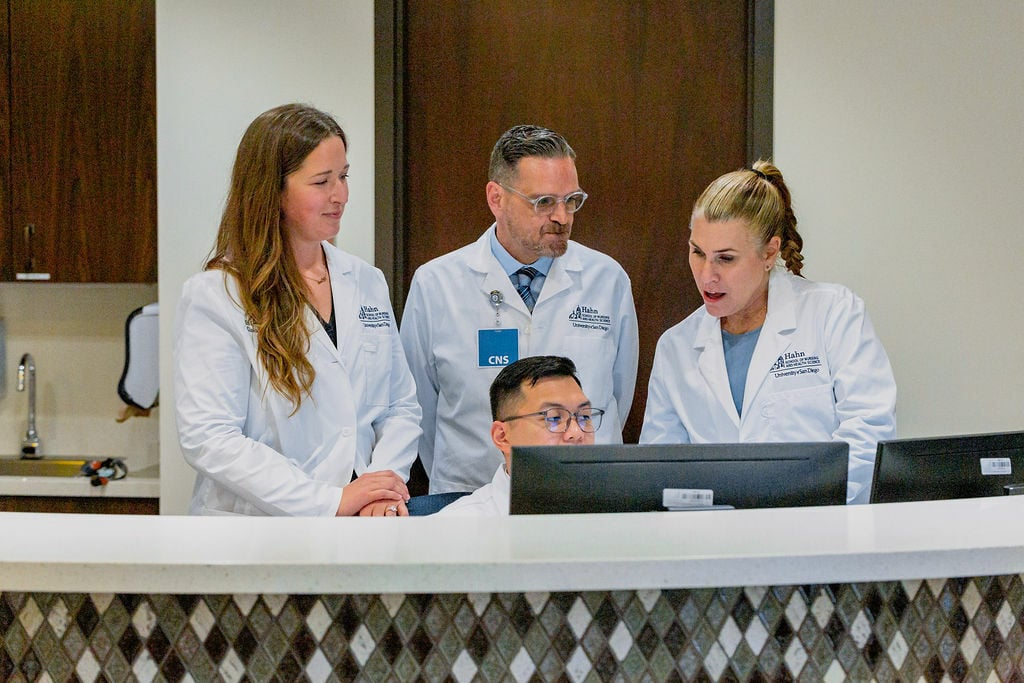
Discover the Benefits of a Nursing Degree From USD
The information in this blog post is for informational purposes only and is not intended to replace medical, financial, or professional advice.
Nurses fulfill a vital role in the world of healthcare, and there are a wide variety of specialty roles nurses take on in the healthcare world—Executive Nurse Leader, Nurse Educator, and Nurse Practitioner, to name a few. Regardless of the specialty role, nurses must possess the compassion and competence it takes to be leaders in the healthcare system.
One role in particular, though, focuses on the extensive knowledge needed to create unique solutions for problems across healthcare and on training the next generation of nursing leaders: the role of a Clinical Nurse Specialist.
What are Clinical Nurse Specialists?
A Clinical Nurse Specialist (CNS) holds advanced knowledge and training in clinical components of healthcare, such as physiology, pharmacology, and physical assessment. A CNS tackles problems with innovative solutions that help patients, nurses, and other healthcare professionals. They are knowledge workers, using their expertise in the healthcare world to better treatments and systems across the arena.
In addition to their training in the clinical aspects of patient care, a CNS studies a comprehensive curriculum on healthcare organization, like process improvement, policies and procedures, and standards of practice. This foundational knowledge is needed to leverage all three spheres of care (organization, nursing, and patient) to influence change.
Clinical Nurse Specialists are qualified to attend to a diverse range of needs. And, depending on state regulations, CNSs can also diagnose patients and prescribe treatments and medications based on their diagnoses.
No matter their specialty or which population they’re focused on, Clinical Nurse Specialists strive to make a difference using their in-depth educational background and problem-solving mindset.
To answer questions about this nursing specialty, USD alumni Kristine Mendoza, APRN-CNS, ACNS-BC, and USD adjunct professor Julie Williams, MSN, CNS, RN, MICN, CEN, have given us a deep-dive into the world of CNS.
What does a Clinical Nurse Specialist do?
Clinical Nurse Specialists are “knowledge workers,” confidently creating unique solutions for existing problems and value care for patients, nurses, and healthcare. They commonly serve as expert consultants for nursing staff.
Here’s what that could look like in practice:
- Selection and validation of new equipment—in addition to training other nurses on it
- Safety incidences: identifying the causes and implementing prevention protocol
- Care of critically ill patients
- Incorporating new evidence-based practices or guidelines of care
- Nurse mentorship—everything from encouraging nurses to obtain a special certificate (ANA, ENA, CNS) to helping them in professional development
- Survey site preparation
- Developing the nursing staff’s competency in knowledge, skills, attitude, accountability, etc.
- Quality improvement in practices and patient care
- Research (patients and nursing)
- Helping promote and maintain system initiatives, especially when it comes to scope of practice and guidelines of care
As the Manager of Innovations and Performance Excellence at Sharp Grossmont Hospital, Kristine Mendoza, APRN - CNS, ACNS-BC knows a lot about the day-to-day of a CNS—especially since she precepts for USD School of Nursing CNS students. She believes that, while a CNS might be knowledgeable on an array of subjects, two core strengths drive a CNS’s consultative approach:
“No matter the situation, your level of emotional intelligence and how vast your communication toolkit is will determine how well those interactions will go and ultimately achieve outcomes.”
Where do Clinical Nurse Specialists work?
Often, specialized nurses work in places distinctive to their specialty. A CNS, though, can work almost anywhere.
Generally, a CNS will have the most impact on an organization that involves the three CNS spheres: patient, nursing, and organization. This opens up an expanse of opportunities for CNSs, including work at places like acute care settings, hospitals, private practices, education systems, corporations, clinics, specialty units, nursing homes, medical and pharmacological suppliers, and in academia.
The specific duties of a CNS change depending on where they work. They may need to perform more direct patient care in some settings while other settings might require more hands-off organization and mentorship. CNSs work under the mission and vision of the organizations they are employed at as well as state laws and regulations.
Why are Clinical Nurse Specialists integral to healthcare?
On one hand, the CNS role is so important because they are on the front lines of healthcare. They have five major responsibilities–teaching, consulting, research, clinical practice, and management – making them versatile and vital to the ever-changing nature of healthcare delivery. Within their responsibilities, CNSs assess for gaps in the organization, ways to optimize the care of patients, and how to foster a safe work environment that embraces positive change.
“Clinical Nurse Specialists are on the frontlines, observing, monitoring, teaching, mentoring and providing care alongside the healthcare task force.”
- Julie Williams, MSN, CNS, RN, MICN, CEN | Adjunct Professor and PhD Student at the University of San Diego Hahn School of Nursing and Health Science
On the other hand, the CNS role is so important because Clinical Nurse Specialists are uniquely positioned to handle complexity, and the U.S. healthcare system is only getting more complex. In fact, healthcare is in the midst of a revolution: technological advances have changed the way healthcare professionals exchange, record, and use information, which has opened up opportunities for collaboration like never before — and a whole can of worms along with it.
In short, Clinical Nurse Specialists possess distinct attributes that help them lead in the workplace. They love searching for and understanding new information; they have growth mindsets, value working with diverse people, and learn from failures. It is because of these strengths CNSs can thrive in their careers.
Clinical Nurse Specialist vs Nurse Practitioner
Both Clinical Nurse Specialists and Nurse Practitioners (NP) are common nurse specializations, and it can be difficult to truly understand where these two roles overlap and where they differ. While CNSs and NPs do share some responsibilities, they also both carry out duties distinct to their positions.
| Clinical Nurse Specialist |
Nurse Practitioner |
|
| Role Summary | CNSs focus more on taking care of the staff, organization, and patients as part of the management team. They do have input into the management of patient care, as well. In some states, a CNS may have prescriptive privileges. |
An NP focuses on direct patient care and patient management:
|
| Typical Practice Area |
Similar to NPs though CNS are often used in Level of Care locations as well as specialty populations |
Acute care settings, hospitals, private practices, clinics, specialty units, nursing homes, etc. |
| Day-to-Day Duties | Working with policy, procedures, guidelines of care, process improvement, patient flow, and competency validation—in addition to patient care | Seeing and treating patients |
| Care Specialties | Specialty populations, type of problem, settings, type of care, or disease. | Like CNSs, NPs can be used for specialty populations (CHF, diabetes, etc.) or can work alongside a primary provider in private settings. |
According to Mendoza, a CNS can generally transition into an NP role easier than an NP can transition into a CNS role, “because the impact of change a CNS is expected to make goes from directly taking care of a patient to organizational implementation change that entails direct ‘care’ among multiple groups of people in the organization.”
Adult-Gerontology Clinical Nurse Specialist
While a Clinical Nurse Specialist is already a type of nurse specialization, Adult-Gerontology is a field a CNS can further specialize in. Keep reading to learn more about Adult-Gerontology and what it looks like to deliver care to this population.
What is Adult Gerontology?
Adult-Gerontology refers to the population of people from later adulthood to the end of life, usually around the age of 65 and older. There has been rising interest in healthcare for this demographic in recent years, as it has become the fastest-growing population in healthcare.
Often, people think of this population as weak, frail, frequently confused, and unable to function independently. In reality, this population loves learning new things and strives to be healthy and happy as they age. Personal implicit bias plays a role in these misconceptions. Nursing has highlighted this topic of implicit bias because it can contribute to inappropriate and delayed care.
Adult-Gerontology Primary Care
There are innumerable benefits to working in adult gerontology primary care.
“In general, I think they demand better ways of doing things which provides us the opportunity to do meaningful work, and I think, to an extent, if you know of or have a boomer in your life that you want to receive great care.”
- Kristine Mendoza, APRN - CNS, ACNS-BC
“[They] provide a wealth of information/knowledge about life. Shared perspectives, family, history and growth. I believe that we can learn from our gerontology population by respecting their lives and honoring their continued passion and knowledge.”
- Julie Williams, MSN, CNS< RN, MICN, CEN
While adult-gerontology patients are in every healthcare department, as an AG-CNS, you are most likely to work in places where this population is denser, such as critical care units, emergency rooms, or neurology or cardiac units.
It is vital that nursing schools continue to promote training for AG-CNSs. Education for AG-CNSs provides comprehensive knowledge for all kinds of care in the healthcare field to help nurses serve not just the fastest-growing population in healthcare, but all populations.
How to become a Clinical Nurse Specialist at USD
Clinical Nurse Specialists have expertise that requires a solid foundational education, so if you want to know how to become a Clinical Nurse Specialist, it starts with an advanced nursing degree.
The University of San Diego Hahn School of Nursing and Health Science is dedicated to educating all nurses to be leaders in the healthcare system and to helping each nurse find specializations suited to their individual skill sets.
USD offers a CNS specialization through our Masters of Science in Nursing program. While many nursing tracks, such as an ENL or NP track, provide education for a specific, specialized scope of practice, the CNS track offers a much broader range of knowledge, preparing CNSs for their roles as knowledge workers in healthcare. USD also offers a dual CNS/ENL track for future nurses who want to hone skills as both a Clinical Nurse Specialist and an Executive Nurse Leader.
Before getting into a degree, it is important to evaluate your personal career goals to know which kind of nursing track you want to enter. You can always schedule a meeting with the CNS program coordinator Dr. Sheree Scott to get more details about what a CNS specialization can do for your career future.
The world needs nurses who are passionate about providing optimal care for patients and leading advancements in the healthcare system.
If you want to learn more about how USD can help you achieve your educational and career goals, you can request more information now. If you know that USD is the next step for you, we invite you to apply today.

The information provided by USD’s Hahn School of Nursing and Health Science is for informational purposes only and is not intended to replace professional medical or financial advice. This includes, but is not limited to, blog posts, eBooks, webinars, emails, graphics, social media posts, and other content. Always seek the guidance of your physician or a qualified medical or financial professional.
A Guide to the University of San Diego's Adult-Gerontology Clinical Nurse Specialist Program
The University of San Diego's nursing program ranks among the best in the nation. But that's not the only reason future students walk through our doors to pursue one of our graduate degrees. Download our guide for an in-depth look at the Adult-Gerontology Clinical Nurse Specialist program and learn how our rich heritage of excellence in nursing education can help you achieve your academic and professional goals.
GET THE GUIDE


-1.jpeg)





